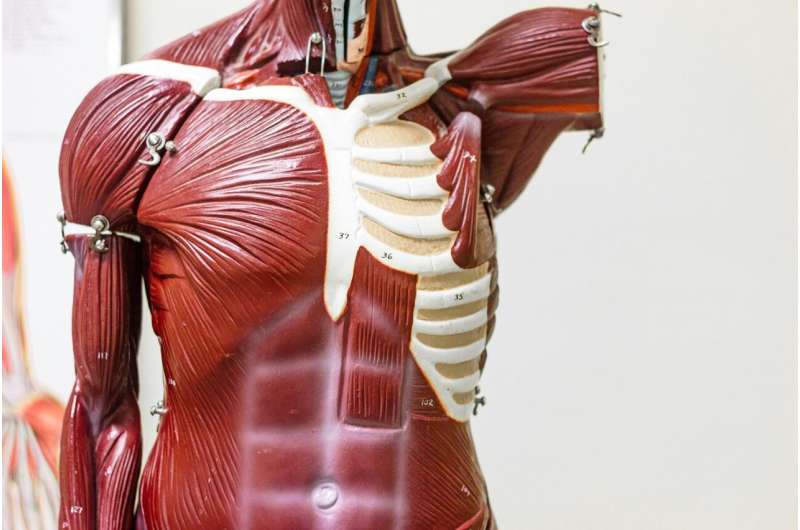
Some of us are all too aware that muscle disappears over time, but the removal of the word “muscle” from anatomical names feels like language imitating life.
All joking aside, there has been a recent purge of the word muscle from anatomical terminology. But this move has an impact on how phrases and expressions are understood.
The official list of Latin anatomical terms, called the Terminologia Anatomica (TA), is produced by the Federative International Program for Anatomical Terminology (FIPAT). In 2019, FIPAT released the second edition of the TA, and one of its new principles states that terms should not have more than one head noun.
This means that every noun after the first one should be possessive, so that we say something like “the branch of the vein of the arm,” with “the branch” being the head noun, since it is the first noun in the phrase.
Labeling muscles
Traditionally, muscles are subdivided using nouns that describe what they do, and these nouns used to be placed right beside the word musculus; for example, we have flexors, extensors, adductors and abductors. The prevailing argument from FIPAT is that it is redundant to write musculus flexor, so their solution is to remove musculus from the name whenever another descriptive noun is already present, thus eliminating what it considers redundancies.
All of this means that the word musculus—which often uses descriptors such as flexor, extensor and abductor—is often no longer designated by its most important word: muscle.
As an example of this, musclus flexor carpi ulnaris was used in the first edition of the TA; this has been changed to flexor ulnaris carpi, which precisely translates to “the ulnar flexor (muscle) of the wrist.”
The second edition of the TA (the TA2) also requires the rearrangement of the adjective ulnaris so that it more closely follows the noun it modifies.
Another significant wrinkle is that not all flexors are muscles, and this creates another problem: since flexor is supposed to be synonymous with the missing noun musculus, what happens when we want to speak of a flexor tendon?
The strange answer (to me, anyway, as a Latinist) appears to be to invent a new adjective out of thin air: flexorius. Now, we have the tendo flexorius communis, or “common flexor tendon.”
The TA2 has created other equally new adjectives to account for similar situations, and as a result we have adductorius, extensorius and levatorius, all of which are built to address a problem that did not exist a few years ago.
This debate acts as an illustration of the broader, ongoing evolution of medical terminology and the traditions it represents.
To be clear, this discussion is centered around the official list of names. In the real world, medical professionals rarely, if ever, use the lengthy official Latin names for the parts of the body.
Global reference
The TA exists to be used as a standardized reference, and it accepts that every language has its own equivalent phrases which act as a type of shorthand. In most English equivalent phrases, medical professionals often forgo saying “muscle” and just say “flexor,” although some may still say “flexor muscle,” treating flexor as an adjective.
This shorthand is how professional language works. It is part of the slang employed, and as long as everyone involved knows what part of the body is being indicated by the code word, it works well.
But the TA is considered the official global terminology, and a lot of anatomists that have never been trained in Latin need to use the TA as a guide, which suggests that shorthand is probably not a good idea.
Limiting understanding
There are some people who disagree with these changes to the Latin anatomical terminology. In a response to FIPAT’s recommendations, a group of anatomical societies from South Africa and the Netherlands argues: “Removing noun appositions by omitting one noun (musculus in the example) may be perceived as non-traditional as well as linguistically and rationally foreign.”
Personally, I would go further than that. I am not an anatomist, but as a Latinist, while I agree that shorter phrases are useful as a practical shorthand, they can create massive problems when applied to the names intended for a global audience.
Eliminating words because governing bodies decide they are redundant can easily prevent others from understanding and using the terminology.
This article is republished from The Conversation under a Creative Commons license. Read the original article.![]()
Citation:
New language guidelines for anatomy aim to improve clarity, but they could reduce understanding instead (2024, June 24)
retrieved 24 June 2024
from https://medicalxpress.com/news/2024-06-language-guidelines-anatomy-aim-clarity.html
This document is subject to copyright. Apart from any fair dealing for the purpose of private study or research, no
part may be reproduced without the written permission. The content is provided for information purposes only.


